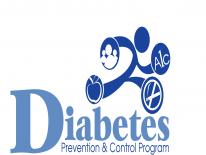
“Control your diabetes, don’t let it control you”
What is Diabetes?
Diabetes is a disorder defined by a lack in production and/or use of insulin. Insulin is a hormone that allows cells in the body to convert sugar, starches and other food into energy. There are several types of diabetes. Type 1 diabetes accounts for approximately 5% of all diagnosed cases of diabetes and its onset is related to genetic, environmental or autoimmune factors. The warning signs for type I diabetes are frequent urination, unusual thirst, extreme hunger, unusual weight loss, extreme fatigue and irritability. Type 2 diabetes is considered a preventable form of diabetes that occurs in 90% to 95% of the individuals diagnosed with diabetes. The warning signs for type 2 diabetes are: any of the type 1 symptoms, frequent infections, blurred vision, cuts/bruises that are slow to heal; tingling/numbness in the hands/feet; recurring skin, gum, or bladder infections. Often people with type 2 diabetes have no symptoms. Gestational diabetes is insulin resistance that develops in some pregnant women, which can later lead to the development of type 2 diabetes. 1-5% of people diagnosed with diabetes may have developed the condition as a result of surgery, drug reactions, malnutrition, hereditary conditions, and/or certain illnesses, such as infections.
Prevent or Delay Type 2 Diabetes
Know the risk factors and try to do something about it. Risk factors for type 2 diabetes include older age, obesity, physical inactivity/sedentary lifestyle, family history of diabetes, and personal history of gestational diabetes. One of the most important and common risk factors for type 2 diabetes is obesity. So be sure to exercise, eat properly, reduce stress and manage your weight.
District of Columbia Diabetes Prevention and Control
The District of Columbia Diabetes Control Program was established to reduce the burden of diabetes in the District of Columbia through partnerships aimed at policy change, sustainable community programming, and health system quality improvements.
Services include:
- Providing support and technical assistance to health care providers and community programs to promote increased access to high quality community-based programs and clinical chronic disease preventive and self-management services
- Providing information on diabetes prevention and self-management resources and services in the District of Columbia
- Promoting important health policy decisions
- Assessing the burden of diabetes in the District of Columbia and providing the latest diabetes-related surveillance data
Diabetes Fact Sheet [PDF] – learn more about the types of diabetes and their risk factors
Diabetes in the District of Columbia [PDF] – learn more about the status of diabetes in the District of Columbia


